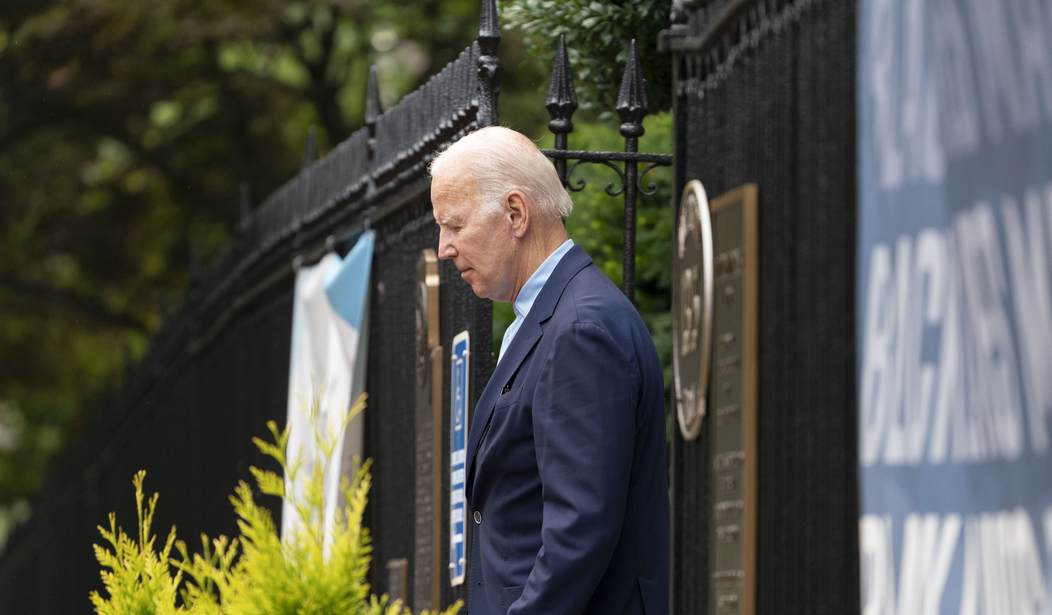Editor's Note: This column was authored by Sean-Michael Pigeon.
As inflation hits a forty-year high and shortages hamstring the American economy, the Biden administration has resorted to wartime rhetoric, blaming higher prices on Russia and corporate greed. But it’s the President’s own policies that are to blame for the U.S.’s deteriorating economic situation — at least in part. Rather than asking the public to accept wartime conditions, the administration should end the war it’s currently waging on consumers.
Since last year, the price of critical commodities like fuel has risen by more than 50 percent — what Biden refers to as a “Putin price hike.” But much of the pain Americans are feeling was avoidable. The Ukraine war has affected prices somewhat, but Biden has been fighting energy companies since his first day in office.
When the administration canceled the Keystone XL pipeline project, commentators warned that it would result in “more inefficient and riskier methods of transporting crude [oil].” The administration’s recent reluctance to grant drilling permits has capped domestic production, and the President’s verbal salvos against large energy firms have caused uncertainty in the marketplace.
Since so much of our economy relies on petroleum, specifically diesel, for transporting goods, the average family is spending $460 more per month than they did last year for the same goods. Americans only expect things to get worse and the situation is particularly dire for low-income individuals.
Government policy contributing to widespread shortages is not just confined to oil and gas markets. The supply shortages of baby formula rocking families across the nation are partly due to the hyperactive government that created an inherently unstable market. Tariffs, import quotas, and overly-restrictive regulatory standards for baby formula production have made it difficult for companies to manufacture formula overseas and sell it in America. Without global competition, just four major companies dominate the American formula market.
Recommended
Domestically, government programs have contributed to the centralization of infant formula producers. The Special Supplemental Nutrition Program for Women, Infants, and Children (WIC), a program that helps low-income families afford formula, awards contract rights to producers in each state. Since states partner with large corporations, companies that are locked out of WIC have a harder time competing, which depresses competition. Thus, a perfect storm of tariffs, regulations, and cronyism made the infant formula market unprepared for when one production plant briefly shut down production earlier this year.
This combination of excessive regulation and crony favoritism has increased prices across the economy. Housing costs, for instance, are spiking nationwide. Urban centers are notorious for high construction costs due to bureaucratic red tape: Buildings must be reviewed, meet zoning regulations, and comply with environmental review. These regulations, combined with the rising cost of building materials, serve to protect the haves at the expense of the have-nots.
Even while housing prices were rising, Biden announced that he was doubling the tariff on softwood lumber from Canada.
The average American (who makes about $41,000 per year) deserves a president willing to fight for her economic benefit. Instead, the Biden administration has signaled to the American people it is our patriotic duty to the liberal world to accept a worsening standard of living.
It’s true that China’s continued shutdown and the tragic invasion of Ukraine have created unforeseen shortages. Politicians could never have predicted these events. But that’s precisely why Washington needs to prioritize strong markets. Inefficiency makes America weaker and more vulnerable.
This administration should start taking concrete steps to improve the economy. It should approve new permits to drill domestically and streamline the application process. The FDA has already signaled that it may loosen restrictions on the global infant formula market. That’s good. The President should use this opportunity to further loosen import quotas across the board and reduce tariffs for critical materials like lumber. While the geopolitical conflicts engulfing the international community are important, there are practical, non-partisan ways to remedy the underlying causes of our economic instability. Our economy needs the president to fight for consumers instead of against them.
Sean-Michael Pigeon is a Young Voices fellow. He has been published in USA Today, The Boston Herald, National Review, and more. He holds a B.A. in Political Science and History from Yale University.

























Join the conversation as a VIP Member